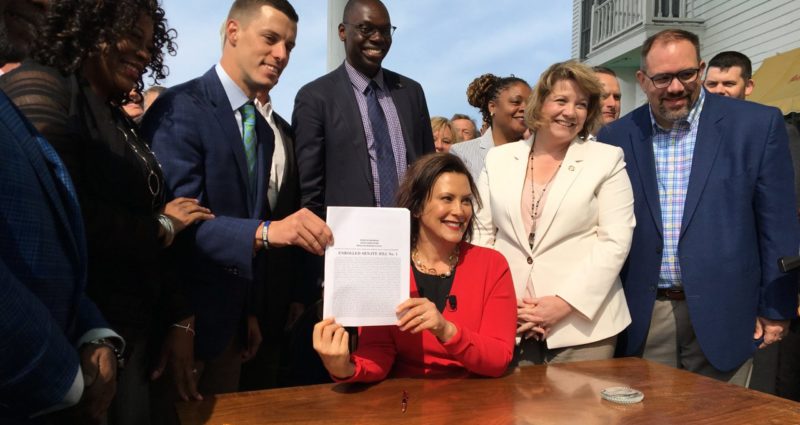
New Law Aims to Lower Insurance Premiums
Author: Ashley Wahl
On May 30, 2019, Governor Gretchen Whitmer signed the new No-Fault legislation into law. The law seeks to reduce insurance premiums by giving drivers the opportunity to choose various levels of No-Fault coverage. While reduced rates may seem alluring, they should not come at the expense of important No-Fault Benefits. Thus, drivers must understand what potential benefits they are sacrificing in lieu of reduced rates.
THE CURRENT NO-FAULT ROADMAP
For now, No-Fault Personal-Injury-Protection Benefits (PIP) are unlimited. Thus, the following benefits are still available to injured drivers who maintain Michigan coverage:
Allowable Expenses: MCLA § 500.3107(1)(a) provides for the reimbursement of expenses that are reasonably necessary to an individual’s care, recovery, and rehabilitation. While this provision is commonly interpreted as being exclusively limited to medical expenses, it is not. Michigan courts have recognized that allowable expenses also includes other products, services, and accommodations – including in-home health care (Attendant Care) provided by nurses, medical attendants, medical aides, or family members; vocational rehabilitation; home modifications; transportation costs (medical mileage); and expenses of a guardian or conservator. Currently, these benefits are unlimited so long as they are related to the automobile accident.
Work Loss:MCLA § 500.3107(1)(b) affords limited reimbursement for income that an insured would have earned “but for” the accident. The work-loss benefit is capped and is available for three (3) years from the date of the accident. However, an insured can only recover 85% of their gross wages unless the insured can show that their wages would have been reduced by a lesser amount.
Replacement Services: MCLA § 500.3107(1)(c) allows reimbursement for expenses incurred for household services that an insured would have performed “but for” the accident (Replacement Services). The benefit is capped at $20 per day and is available for up to three (3) years from the date of the accident. Replacement services often include services such as doing the laundry, grocery shopping, doing yard work, cleaning the house, and cooking meals.
Michigan Catastrophic Claims Association (MCCA): The MCCA reimburses an injured driver’s insurance company once the individual’s medical expenses exceed $555,000.
HOW THE EXISTING NO-FAULT LAW WILL CHANGE
In July 2020, the new law will begin taking effect. This means drivers will no longer be afforded unlimited benefits automatically. Drivers will instead be allowed to choose coverage levels.
Coverage Levels: For auto policies issued after July 1, 2020, drivers will no longer be legally required to purchase unlimited No-Fault PIP benefits. Instead, drivers will have the choice of the following coverage levels: $50,000 (if a Medicaid recipient); $250,000; $500,000; or unlimited. Further, Medicare recipients will have the option to “opt-out” of maintaining PIP benefits. The new law promises No-Fault savings for all coverage levels (45% for the $50,000 cap; 35% for the $250,000 cap; 20% for the $500,000 cap; and 10% for unlimited benefits).
Under the new law, whether you are entitled to certain allowable expenses (i.e., attendant care, transportation costs, and home medications), replacement services, and work loss will depend on your coverage amount.
If an injured driver’s medical expenses exceed the driver’s medical insurance coverage, the driver’s recourse will be to sue the negligent driver for excess medical benefits.
Attendant Care: Currently, a family member can get paid an hourly rate for providing up to 24 hours a day (168 hours per week) of attendant care benefits to an injured driver. Under the new law, family-provided attendant-care is capped at 56 hours per week (approximately 8 hours per day).
Michigan Catastrophic Claims Association (MCCA): The MCCA will continue to be only liable for catastrophic injury benefits payable under unlimited medical benefits policies.
ADDITIONAL CHANGES TO MICHIGAN’S AUTO LAW
There are additional changes to Michigan auto law that will also affect Michigan drivers as of July 2020.
Liability Limits: Currently, drivers are only required to maintain a minimum of $20,000 per person / $40,000 per occurrence in bodily injury insurance. The new law increases the minimum limits to $50,000 per person / $100,000 per occurrence.
Mini Tort: Michigan’s mini tort recovery limit will increase to $3,000.
Non-Driving Factors: The new law prohibits insurers from considering certain non-driving factors when determining rates – such as gender; marital status; zip code; and occupation.
Senate Bill No. 1 and its history can be found here: http://www.legislature.mi.gov/(S(x03znudi1jehfqxtcrmmw1jd))/mileg.aspx?page=GetObject&objectname=2019-SB-0001
If you were injured in a car accident and would like more information regarding your rights to recovery, please contact the experienced personal injury attorneys at Dingeman & Dancer, PLC, (231) 929-0500, 100 Park St., Traverse City, MI 49684.